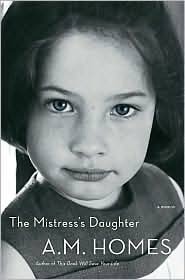The Mistress's Daughter
Summary (from the publisher): Before A.M. Homes was born, she was put up for adoption. Her birth mother was a twenty-two- year-old single woman who was having an affair with a much older married man with children of his own. The Mistress's Daughter is the story of what happened when, thirty years later, her birth parents came looking for her.
Homes, renowned for the psychological accuracy and emotional intensity of her storytelling, tells how her birth parents initially made contact with her and what happened afterward (her mother stalked her and appeared unannounced at a reading) and what she was able to reconstruct about the story of their lives and their families. Her birth mother, a complex and lonely woman, never married or had another child, and died of kidney failure in 1998; her birth father, who initially made overtures about inviting her into his family, never did.
Then the story jumps forward several years to when Homes opens the boxes of her mother's memorabilia. She had hoped to find her mother in those boxes, to know her secrets, but no relief came. She became increasingly obsessed with finding out as much as she could about all four parents and their families, hiring researchers and spending hours poring through newspaper morgues, municipal archives and genealogical Web sites. This brave, daring, and funny book is a story about what it means to be adopted, but it is also about identity and how all of us define our sense of self and family.
Review: This memoir is about Homes' exploration of her identity as a adopted child when she is sought out by her birth parents as an adult. Rather than a happy reunion, she finds complex and far less than satisfactory relationships with both. Her birth mother seems mentally unbalanced and begins to stalk her and her father, a much older, married man with four other children, makes overtures but then abruptly cuts her off. This is her search to reconcile the two sides of her parentage with her identity. The memoir reads like a series of short stories each dealing with a different facet of her story.
A lot of the reviews cite complaints that they found this memoir "whiny" and I sympathize with that. However, this is her memoir about her family, and her space to talk about her feelings, so it's sort of unfair to then hold that against her. I found her frank emotional honesty very striking and moving. I was appalled by the way her birth parents treated her and I can only imagine how that would impact my self-esteem and identity. How do you not feel rejected by two genetic parents who turn you away over and over and over? "I understand,' he says. 'Call me. Call me in the car. My wife isn't in the car very often - we can talk.' 'I'm not your mistress. I'm your daughter. And I'm not calling you in your car,' I say. 'Fine thing,' he replies."
While I totally think that Homes was justified in expressing her feelings, my only frustration with this book was her seeming lack of concern for her adoptive parents. In the small mentions of her adoptive family, they seem loving and provided a great home for her. Yet little is said about their role or feelings in Homes' account. If I was the mother who had raised her, I would be deeply wounded by the lack of feeling she displays.
I did, however, like that Homes ends on a positive with a chapter about her adoptive grandmother (the only adoptive family member focused on and only family member period described in a positive light). I love the way she describes her grandmother: "When I graduated from college and wanted to become a writer, she lent me the money to buy an IBM Selectric typewriter. I dutifully paid her back $50 a month, and when the debt was repaid, she wrote me a check for the entire amount. 'I wanted you to know what it means to work for something.'"
A frank look at what its like to be adopted and to feel suspended between two families, one foot in each. In short, a look at the universal human question of who am I?
Stars: 4



Comments
Post a Comment